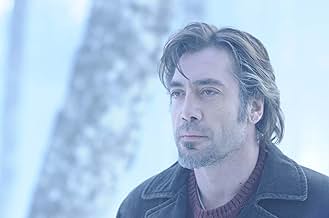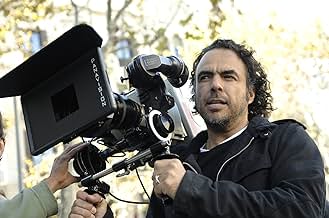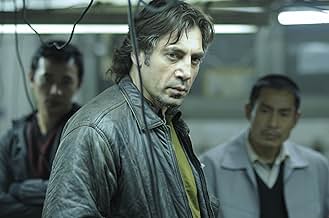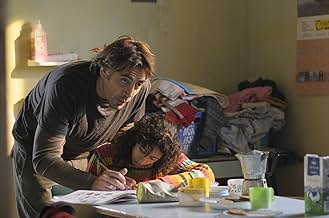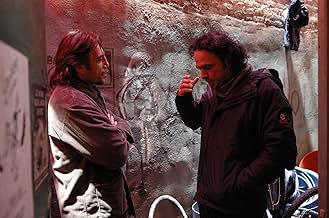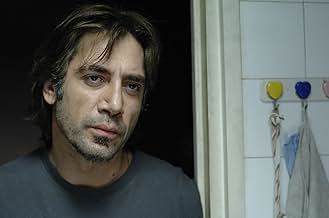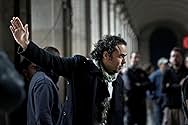IMDb-BEWERTUNG
7,4/10
96.493
IHRE BEWERTUNG
Dies ist die Geschichte von Uxbal, einem Mann, der zwar in dieser Welt lebt, aber gleichzeitig auch seinen Tod sieht, der jeden seiner Schritte lenkt.Dies ist die Geschichte von Uxbal, einem Mann, der zwar in dieser Welt lebt, aber gleichzeitig auch seinen Tod sieht, der jeden seiner Schritte lenkt.Dies ist die Geschichte von Uxbal, einem Mann, der zwar in dieser Welt lebt, aber gleichzeitig auch seinen Tod sieht, der jeden seiner Schritte lenkt.
- Für 2 Oscars nominiert
- 21 Gewinne & 65 Nominierungen insgesamt
Taishen Cheng
- Hai
- (as Taisheng Cheng)
Empfohlene Bewertungen
"Biutiful" is a sublime and intense epic - and possibly the best film of the year. Even though its setting is very different, the film shares themes with "American Beauty", and succeeds in creating something close to a modern myth. It tells the story of Uxbal, the tough but loving single father of two young children, separated from his self-destructive bi-polar wife. He scrapes a living in the backstreet black economy of Barcelona, where he operates as a middleman for those who exploit illegal immigrant labor. Uxbal possesses the psychic ability to convey messages from the recently deceased - and sometimes he compromises his principles by accepting payment for this gift.
Uxbal's conflicted way of life reflects the essential human condition - trapped between the spiritual and material worlds. When he learns that he's terminally ill with cancer, his body seems to be manifesting his inner discord. After learning his fate, Uxbal begins searching for a trustworthy person to raise his two children after his death - and "Biutiful" tells of his struggle to accomplish this task while dark forces throw obstacles in his path. Those who have seen Inarritu's previous film "Amores Perros" will find themselves in familiar territory as Uxbal weaves his way through multitudes of desperate souls battling for survival. On the surface there's only the brutality of a dog-eat-dog world, alleviated by brief moments of tenderness and self-sacrifice. Hidden amidst the chaos, one can see the age-old journey of the immortal hero towards liberation.
Uxbal's conflicted way of life reflects the essential human condition - trapped between the spiritual and material worlds. When he learns that he's terminally ill with cancer, his body seems to be manifesting his inner discord. After learning his fate, Uxbal begins searching for a trustworthy person to raise his two children after his death - and "Biutiful" tells of his struggle to accomplish this task while dark forces throw obstacles in his path. Those who have seen Inarritu's previous film "Amores Perros" will find themselves in familiar territory as Uxbal weaves his way through multitudes of desperate souls battling for survival. On the surface there's only the brutality of a dog-eat-dog world, alleviated by brief moments of tenderness and self-sacrifice. Hidden amidst the chaos, one can see the age-old journey of the immortal hero towards liberation.
Ordinarily I like these kinds of films about people struggling to overcome the odds of a bad deal.But in this film, Uxbal, the protagonist, has to struggle against every bad thing can ever happen to a person and all in a very short window of time. Death would be a welcome relief. Javier Bardem plays his role extremely well though; I felt his anguish over his children and the immigrants he "managed." His story gets weighed down, unfortunately, by the number of tragedies he must endure and the tasks he must execute. The director could have eliminated/edited a few of the off-point character traits and side stories to streamline the story for impact, which would have helped the film deliver more of a meaningful punch, not less.
In addition, the summary of this movie says Uxbal must suffer a number of tragedies on the way to redemption. I'm not sure there is any redemption here. In Children of Men, the protagonist endures a lot and struggles through his own character defects to protect an black female fugee whose pregnancy provides hope for the human race. We feel joyful at the end of CofM because he has accomplished his task despite the odds. The ending of Biutiful, however, lacks a clear meaning and we're unsure of everyone's fate except for Uxbal's. The experience was depressing.
I gave the movie an 8 because it was beautifully produced and well acted; the story was original, an uncommon view of Barcelona and the immigrants who go there for work under terrible conditions. But I doubt if anyone would want to see this film more than once.
In addition, the summary of this movie says Uxbal must suffer a number of tragedies on the way to redemption. I'm not sure there is any redemption here. In Children of Men, the protagonist endures a lot and struggles through his own character defects to protect an black female fugee whose pregnancy provides hope for the human race. We feel joyful at the end of CofM because he has accomplished his task despite the odds. The ending of Biutiful, however, lacks a clear meaning and we're unsure of everyone's fate except for Uxbal's. The experience was depressing.
I gave the movie an 8 because it was beautifully produced and well acted; the story was original, an uncommon view of Barcelona and the immigrants who go there for work under terrible conditions. But I doubt if anyone would want to see this film more than once.
Biutiful is a departure and a confirmation for Mexican director Alejandro Gonzalez Inarritu: on the one hand, it is another study of lives gone awry, with no punches pulled in regards to the misery experienced by the characters; on the other, it's the first film he's made he parted ways with screenwriter Guillermo Arriaga, who preferred to move on to other projects after Babel. Biutiful proves two things: firstly, Inarritu remains very good at constructing memorable images; secondly, these aren't worth quite as much without Arriaga's words.
Set in Barcelona, the film ditches the filmmaker's traditional fragmented, multi-character narrative, focusing solely on one imposing figure: Uxbal (Javier Bardem), a man who has to deal with his own imminent death from cancer, a dire relationship with his family (wife, kids and brother), his ties to local criminal activities and, more generally, the ugliness he sees every day walking down the streets. Surely the (intentionally misspelled) title must be ironic.
Working on the script himself, Inarritu goes for a simpler story, but doesn't renounce his penchant for harrowing material. In fact, Biutiful is undoubtedly the least cheerful film he's directed to this day, and that's saying something. His depiction of a gray, ugly Barcelona is faultless, exposing the city's seedy underbelly and disease (both physical and spiritual) with genuine, relentless storytelling passion. However, this is also detrimental to the film's impact: without Arriaga's more experienced take on the subject, the director doesn't know when to stop, throwing in one tragedy after another for the best part of the movie's 148 minutes, with no pause for breathing. It's almost too bleak, too tragic, to fully convince as a drama.
Does this mean all the praise Inarritu has received in the past was premature? Not really. Even his detractors usually acknowledge his talent with actors, and in this case, perhaps being aware of the script's shortcomings, he has hit the jackpot: from start to finish, Bardem is a revelation, justly awarded with the Best Actor prize in Cannes. Sure, he's always been a gifted thespian, and no stranger to difficult parts (see The Sea Inside), but here he's really in a class of his own. Communicating with his sad, tired eyes rather than his broken voice, he carries the whole picture with a stoic dignity that is always gripping and heartbreaking.
While easy to mock and criticize, Biutiful, for all its flaws, warrants at least one viewing on the grounds that it proves beyond doubt that sometimes a truly astounding performance can save an otherwise mediocre film.
Set in Barcelona, the film ditches the filmmaker's traditional fragmented, multi-character narrative, focusing solely on one imposing figure: Uxbal (Javier Bardem), a man who has to deal with his own imminent death from cancer, a dire relationship with his family (wife, kids and brother), his ties to local criminal activities and, more generally, the ugliness he sees every day walking down the streets. Surely the (intentionally misspelled) title must be ironic.
Working on the script himself, Inarritu goes for a simpler story, but doesn't renounce his penchant for harrowing material. In fact, Biutiful is undoubtedly the least cheerful film he's directed to this day, and that's saying something. His depiction of a gray, ugly Barcelona is faultless, exposing the city's seedy underbelly and disease (both physical and spiritual) with genuine, relentless storytelling passion. However, this is also detrimental to the film's impact: without Arriaga's more experienced take on the subject, the director doesn't know when to stop, throwing in one tragedy after another for the best part of the movie's 148 minutes, with no pause for breathing. It's almost too bleak, too tragic, to fully convince as a drama.
Does this mean all the praise Inarritu has received in the past was premature? Not really. Even his detractors usually acknowledge his talent with actors, and in this case, perhaps being aware of the script's shortcomings, he has hit the jackpot: from start to finish, Bardem is a revelation, justly awarded with the Best Actor prize in Cannes. Sure, he's always been a gifted thespian, and no stranger to difficult parts (see The Sea Inside), but here he's really in a class of his own. Communicating with his sad, tired eyes rather than his broken voice, he carries the whole picture with a stoic dignity that is always gripping and heartbreaking.
While easy to mock and criticize, Biutiful, for all its flaws, warrants at least one viewing on the grounds that it proves beyond doubt that sometimes a truly astounding performance can save an otherwise mediocre film.
"Do not go gentle into that good night. Rage, rage against the dying of the light" – Dylan Thomas
Nominated for an Oscar for both Best Foreign Film and Best Actor (Javier Bardem), Alejandro Inarritu's Biutiful is a story about those who live on the margins: Sengalese immigrants, Chinese sweatshop workers, small-time criminals, and corrupt cops who feed at the trough. Set in the seedy back streets of Barcelona, Spain, Biutiful (copying a child's spelling of the word) is not only about fear and degradation but also about faith in the possibility of redemption. The film not only explores the pain caused by globalization and human trafficking but also delves into the mystery and contradictions of life in which beauty and misery can exist side by side. It is not always pleasant to watch but it is an honest and often poetic film in which there are no stock characters. Even the worst of them are three-dimensional human beings caught in a tangled web of circumstances.
Magnificently performed by Bardem, Uxbal works as a middle man, finding jobs on construction sites for undocumented aliens from China and Africa, and supplying goods to illegal street vendors. He must deal not only with the illegal activities he has chosen to be a part of, but with his own torments - a wife (Maricel Alvarez) who is a prostitute and suffers from bi-polar disease, his two small children, Ana and Mateo (Hanaa Bouchaib and Guillermo Estrella) who long for stability and love, and a diagnosis of cancer that gives him only a few months to live. Uxbal is a character of contradictions, caught between his willingness to do what it takes to survive, even if it means going outside the law, and his love for his family and concern for the immigrants. These contradictions do not always make sense but lend his character a lifelike reality. He is also a spiritual medium who speaks with the dead or dying who are crossing over and provides comforting messages to those left behind (characteristically for a fee).
The film is shot by Rodrigo Prieto with a hand-held camera that enhances a feeling of intimacy. In the opening scene, Uxbal is seen in a snowy forest with his grandfather who left Spain for Mexico, another connection between Uxbal and the spirit world. This scene takes on more meaning by the end of the film. Inarritu throws many people and many situations into the mix, perhaps too many and the subplots do not always gel. There is Uxbal's brother Tito (Eduard Fernandez) who is involved with drugs and strip joints and sleeps with Uxbal's wife Marambra, a Sengalese family Ekweme and Ige (Cheijh Ndiave and Diaryatou Daff) living in Spain illegally, and the relationship of two gay Chinese criminals Hai and Liwei (Cheng Tai Shen and Luo Jin).
When the police arrest his friend, Ekweme, Uxbal promises to look after his wife Ige and their infant son Samuel and Ige takes on the role of his nanny, much to the delight of the children. As Uxbal's health begins to fail, his ties to the crime bosses come asunder, and his relationship with his family reaches a breaking point, he turns to the shaman Bea (Ana Wagener) to seek guidance, ask for forgiveness, and strengthen his connection to the other side. While Uxbal is not the reincarnation of St. Francis of Assisi and has contributed to human suffering, he seeks redemption in the love that he provides for his children, his patience with his wife's condition, and his attempts to reach out and protect the exploited.
As Inarritu has said, "Even if darkness seems to be everywhere, Biutiful offers many touches of hope. I'd even say it's my most optimistic film. Uxbal's character is full of light. He puts a lot into organizing his life, helping his children, loving other people." To paraphrase Walt Whitman, "If you have patience and indulgence towards people, reexamine all you have done, dismiss what insults your very soul, your flesh shall become a great poem." With whatever dignity he has left and after much resistance, Uxbal comes to terms with his own mortality, helping him to move beyond guilt and despair to confirm the beauty and preciousness of life.
Nominated for an Oscar for both Best Foreign Film and Best Actor (Javier Bardem), Alejandro Inarritu's Biutiful is a story about those who live on the margins: Sengalese immigrants, Chinese sweatshop workers, small-time criminals, and corrupt cops who feed at the trough. Set in the seedy back streets of Barcelona, Spain, Biutiful (copying a child's spelling of the word) is not only about fear and degradation but also about faith in the possibility of redemption. The film not only explores the pain caused by globalization and human trafficking but also delves into the mystery and contradictions of life in which beauty and misery can exist side by side. It is not always pleasant to watch but it is an honest and often poetic film in which there are no stock characters. Even the worst of them are three-dimensional human beings caught in a tangled web of circumstances.
Magnificently performed by Bardem, Uxbal works as a middle man, finding jobs on construction sites for undocumented aliens from China and Africa, and supplying goods to illegal street vendors. He must deal not only with the illegal activities he has chosen to be a part of, but with his own torments - a wife (Maricel Alvarez) who is a prostitute and suffers from bi-polar disease, his two small children, Ana and Mateo (Hanaa Bouchaib and Guillermo Estrella) who long for stability and love, and a diagnosis of cancer that gives him only a few months to live. Uxbal is a character of contradictions, caught between his willingness to do what it takes to survive, even if it means going outside the law, and his love for his family and concern for the immigrants. These contradictions do not always make sense but lend his character a lifelike reality. He is also a spiritual medium who speaks with the dead or dying who are crossing over and provides comforting messages to those left behind (characteristically for a fee).
The film is shot by Rodrigo Prieto with a hand-held camera that enhances a feeling of intimacy. In the opening scene, Uxbal is seen in a snowy forest with his grandfather who left Spain for Mexico, another connection between Uxbal and the spirit world. This scene takes on more meaning by the end of the film. Inarritu throws many people and many situations into the mix, perhaps too many and the subplots do not always gel. There is Uxbal's brother Tito (Eduard Fernandez) who is involved with drugs and strip joints and sleeps with Uxbal's wife Marambra, a Sengalese family Ekweme and Ige (Cheijh Ndiave and Diaryatou Daff) living in Spain illegally, and the relationship of two gay Chinese criminals Hai and Liwei (Cheng Tai Shen and Luo Jin).
When the police arrest his friend, Ekweme, Uxbal promises to look after his wife Ige and their infant son Samuel and Ige takes on the role of his nanny, much to the delight of the children. As Uxbal's health begins to fail, his ties to the crime bosses come asunder, and his relationship with his family reaches a breaking point, he turns to the shaman Bea (Ana Wagener) to seek guidance, ask for forgiveness, and strengthen his connection to the other side. While Uxbal is not the reincarnation of St. Francis of Assisi and has contributed to human suffering, he seeks redemption in the love that he provides for his children, his patience with his wife's condition, and his attempts to reach out and protect the exploited.
As Inarritu has said, "Even if darkness seems to be everywhere, Biutiful offers many touches of hope. I'd even say it's my most optimistic film. Uxbal's character is full of light. He puts a lot into organizing his life, helping his children, loving other people." To paraphrase Walt Whitman, "If you have patience and indulgence towards people, reexamine all you have done, dismiss what insults your very soul, your flesh shall become a great poem." With whatever dignity he has left and after much resistance, Uxbal comes to terms with his own mortality, helping him to move beyond guilt and despair to confirm the beauty and preciousness of life.
"Biutiful" is devastating. Not only isn't it a comfortable and audience-pleasing film but in this case the story's really shocking, well acted and directed and, overall, terribly sad. The film is basically about good and evil, death and life and similar topics. These themes are very effectively expressed in its atmospheric and innovative photography. Iñarritu's camera gets to detect images of fierce and brilliance in the squalor. Javier's face is painted with light and shadows, as well as with a sinister appearance suggesting strong contrition and redemption. Uxbal's efforts to make some generous deeds before his death are rendered in a terrific performance, which manages to elevate the bleak subject to a sublime level. "Biutiful" is a work of extraordinary vitality and humanity, with figures of untarnished quality (Uxbal's children and the Senegalese immigrant who'll raise them after his death). On a personal level Uxbal comes to terms with the close death but eventually shows a vision of reconciliation with the life he must leave behind. Watching the film is a really a must.
WUSSTEST DU SCHON:
- WissenswertesJavier Bardem's part in this film is the first time that a performance entirely in the Spanish Language has been nominated for an Academy Award Best Actor Oscar.
- PatzerIn the scene where there are three dead boys lying, the hands of the middle boy changes in between shots.
- Crazy CreditsDedication shown before ending credits: "To my beautiful old oak...Héctor González Gama, my father"
- VerbindungenFeatured in The Tonight Show with Jay Leno: Folge #19.61 (2010)
- SoundtracksComo te extraño mi amor
Performed by Café Tacvba
Written by Leo Dan (as Leopoldo Dante Tévez)
Courtesy of Warner Music México, S.A. De C.V.
Publishing Emi Music Publishing
Top-Auswahl
Melde dich zum Bewerten an und greife auf die Watchlist für personalisierte Empfehlungen zu.
- How long is Biutiful?Powered by Alexa
Details
- Erscheinungsdatum
- Herkunftsländer
- Offizielle Standorte
- Sprachen
- Auch bekannt als
- Những Giây Phút Cuối
- Drehorte
- Produktionsfirmen
- Weitere beteiligte Unternehmen bei IMDbPro anzeigen
Box Office
- Bruttoertrag in den USA und Kanada
- 5.101.237 $
- Eröffnungswochenende in den USA und in Kanada
- 457.206 $
- 30. Jan. 2011
- Weltweiter Bruttoertrag
- 25.147.786 $
- Laufzeit2 Stunden 28 Minuten
- Farbe
- Sound-Mix
- Seitenverhältnis
- 2.35 : 1
Zu dieser Seite beitragen
Bearbeitung vorschlagen oder fehlenden Inhalt hinzufügen


![Tráiler [OV] ansehen](https://m.media-amazon.com/images/M/MV5BZjNkYzhlODMtNjc2YS00ZDAwLWIyMGUtNmNhOTY3N2VhMDU1XkEyXkFqcGdeQXRodW1ibmFpbC1pbml0aWFsaXplcg@@._V1_QL75_UX500_CR0)


